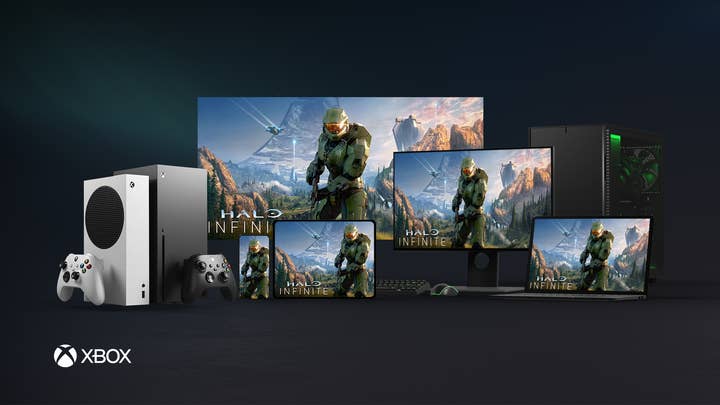Xbox wants to release a game every three months
The company lays out its ambition to reach billions of gamers
Xbox says it will continue to invest in and acquire new studios as it aims to release a new first-party game every three months.
During a special E3 pre-brief featuring the Xbox and Microsoft executive team, the company laid out its vision for the future of the video games industry and for Xbox. Regular readers of GamesIndustry.biz will be familiar with the strategy, but it ultimately revolves around Game Pass and xCloud, which the company hopes will allow it move beyond the '200 to 300 million' audience on consoles to reach billions of consumers.
"[In order to keep growing] we need to expand our audience beyond console to new demographics and geographies we haven't reached before and provide meaningful value for that audience to choose to spend their money with us," says Xbox chief financial officer Tim Stuart.

"And that's exactly what we've been doing over the last eight years or so. First, we needed to refocus the business. We had moved away from our core focus on delivering the best gaming experience, so we needed to get that back on track and repair our relationship with our most important customers. We needed to ensure we had the right experience focused on the gamers, with the right price, and we did that.
"Then we spent the next three or four years developing our strategy. 'What does Xbox want to be when it grows up?' And 'How do we leverage more of Microsoft's core assets and strengths?.' "We started the shift and made investments required to deliver that strategy across content, experiences and hardware.
"And now the last couple of years have been about execution, seeing through on our bets. Whether it was launching new consoles or cloud gaming or Game Pass, we wanted to make sure we had the right pieces in place with a content engine to back all of it up."
"We need to expand our audience beyond console to new demographics and geographies"
Tim Stuart, Xbox
One of the key elements of the strategy involves going 'beyond the console,' which is something the company has been doing by putting its games on PC and xCloud. To make the most of that, it wants games to have cross-play and cross-progression so that gamers can switch devices and play with friends irrespective of the device they're using.
This is in part what our interview with Sarah Bond was all about last month, where she detailed the company's strategy of making technology and cloud services more affordable and available to independent developers. The idea is to democratise games development so that things like cross-play aren't just something the big AAA game developers can afford.
This should also help games become more accessible and welcoming, as it should empower creators from different backgrounds. This is another key element of the strategy.

During the briefing, corporate vice president of Xbox operations Dave McCarthy detailed all the things the company is working on to make sure gaming on Xbox is safer and more inclusive. This includes things like the Xbox adaptive controller, new accessibility features like speech-to-text and text-to-speech, accessibility guidelines for developers, partnerships with underrepresented communities and groups, text and image filtering, enhanced parental controls and more.
"Being intentionally inclusive is business critical if we are to meet the needs of billions of players across the world," says McCarthy.
Head of Xbox Game Studios Matt Booty said later in the briefing: "You'll see us put more commitment and resources into bringing diverse voices into our games and into our teams. As our audience expands around the world to include people from all walks of life, we need to foster and support people seeing themselves in their entertainment."
"Being intentionally inclusive is business critical if we are to meet the needs of billions of players across the world"
Dave McCarthy, Xbox
Accessibility and inclusivity, platform expansion, cloud technology, democratising development and subscriptions are the main strategic elements underpinning Xbox's ambitions. But all of this is meaningless without the software. Microsoft's games output in recent years has fallen behind the competition, in terms of scale, quantity and -- in some cases -- quality. This is where the firm's acquisition strategy comes into play.
Microsoft has spent huge sums expanding its studio network, most notably with last year's acquisition of Bethesda. The goal is to have a more consistent flow of good games going into Game Pass. But not just games built for US console gamers, but for people around the world, playing on all sorts of platforms.
"We want to get to a point of releasing a new game every quarter," Booty said. "Games take up to four or five years to make, and the reality is that not every project we start will make it to launch. But if you add all that up, that's how we've gotten to our state today, with two dozen studios making games across a variety of genres. And we know that a thriving entertainment service needs a consistent and exciting flow of new content so our portfolio will continue to grow as our service grows."

Xbox boss Phil Spencer continued: "The bottom line is that we simply put out more top quality games in front of more people than other companies.

"Across the Xbox ecosystem, we're now reaching hundreds of millions of people every month, and our total addressable market is going to grow, while others are relatively static. As the Xbox ecosystem grows in both content and total size, it becomes more valuable to both players and our partners. So right now, we are the only platform shipping games on console, PC and cloud simultaneously. Others bring console games to PC years later, not only making people buy their hardware upfront, but then charging them a second time to play on PC.
"And of course, all of our games are in our subscription service day one, full cross-platform included."
Part of the briefing was also about showing the commitment of the wider Microsoft organisation to the Xbox business. There was even a chat with Microsoft CEO Satya Nadella.
"Others bring console games to PC years later, not only making people buy their hardware upfront, but then charging them a second time on PC"
Phil Spencer, Xbox
"We believe we can play a leading role in democratizing gaming and defining that future of interactive entertainment, quite frankly, at scale," Nadella said.
"There are really three, I think, areas or key areas where we believe we have incredible competitive advantage. First is our leadership in cloud computing; second, the resources we have to build out the subscription value with Xbox Game Pass; and third is our overall focus on empowering creators. I'm really excited about the opportunity in gaming."
CFO Stuart said Microsoft has two criteria for the businesses it operates it. It needs to be a large, growing marketing of global scale, and a market where it can drive "meaningful market share". Gaming fits both of those things.
"One of the things we're seeing is that gaming and entertainment industries are changing in ways that are really similar to changes in Microsoft's Enterprise businesses," Spencer said.

"In both consumer and enterprise, we are moving from packaged products and towards ongoing engagement and service-based relationships. In gaming, that's exactly what we're driving with Xbox Cloud Gaming and with Game Pass. And in both of these areas, Microsoft's assets in cloud and our global footprint are critical.
"But what makes us different from a service like Netflix is that we give players both options, a subscription package and also a full retail store. And we're seeing the positive results in our financials."
Spencer said that Xbox believes it will increase its market share on console because it has both the lowest-priced next-gen machine in Xbox Series S, and the most powerful console in Xbox Series X. He also states that Game Pass "is turning into a deciding factor in people choosing which console to buy".
He also revealed that Xbox has more than doubled its first-party game sales on PC. He states that the strategy is already working, but there's obviously a long way to go.
"We are here to bring the joy and community of gaming to everyone on the planet," said Spencer said. "To achieve that, our aspiration is to empower everyone to play the games you want, with the people you want, anywhere you want.
"That's a big change to how this industry has traditionally worked. In the past, a lot of game companies have been about locking players into certain hardware and erecting barriers between players. We are taking a different approach, because we believe that games, that interactive entertainment, aren't really about hardware and software, it isn't about pixels, it's about people.
"Games bring people together. Games build bridges and forge bonds, generating mutual empathy among people all over the world. Joy and community. That's why we're here. And we want everyone on earth to be able to join in, no matter what device they have access to, or where you are, and without spending a lot of money on every bit of individual entertainment.
"Achieving our mission is not going to be easy, and we've got a long way to go, but we believe only Microsoft can bring to bear the global scale, the vast wellsprings of technical innovation, the financial resources, and the deep decades-long legacy in video games required to truly bring the joy and community of gaming to everyone."

